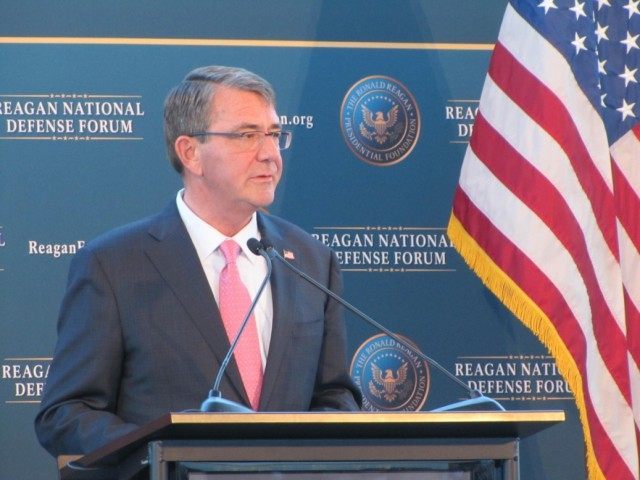SIMI VALLEY — U.S. Secretary of Defense Ashton Carter “strongly” urged passage of the highly controversial Trans-Pacific Partnership trade deal in the midst of addressing U.S. challenges from Russia and China during his keynote address to a host of Reagan National Defense Forum attendees on Saturday afternoon.
Carter said of the TPP:
The United States also, importantly, needs to build on its political and economic engagement in the [Asia-Pacific] region, most importantly by finalizing the Trans-Pacific Partnership trade agreement, or TPP. I have strongly backed TPP because of its strategic significance, and urge all of my Congressional colleagues here today to support it.
The text of the previously highly secretive TPP was released to the public on Thursday.
Carter’s comments came in the course of a discussion of the challenges facing the United States from Russia and China. They challenge our capacity, Carter said.
In regards to Russia, he said:
We do not seek a cold, let alone a hot war with Russia. We do not seek to make Russia an enemy. But make no mistake; the United States will defend our interests, our allies, the principled international order, and the positive future it affords us all.
“We are adapting our operational posture and contingency plans as we–on our own and with allies–work to deter Russia’s aggression, and to help reduce the vulnerability of allies and partners,” Carter said. Emphasis was put on modernizing America’s nuclear arsenal in order to deal with the continually developing technologies of other nations. Additional emphasis was put on the importance of sanctions.
Carter called NATO a continual cornerstone in Europe, but said that “NATO needs a new playbook.” He called especially for strengthening NATO’s cyber defense.
Carter also revealed that he had accepted an invitation to visit China.
I also accepted this past week an invitation from China’s President Xi to visit China in the New Year. There, we will surely discuss our differences, but we can also talk about the many opportunities we have to work together to address common challenges, such as climate change, piracy, and humanitarian disasters, among many others.
“Even as we change how we fight, we will never change what we fight for,” Carter concluded, hailing to the more than 450,000 military men and women serving abroad.
Follow Michelle Moons on Twitter @MichelleDiana

COMMENTS
Please let us know if you're having issues with commenting.